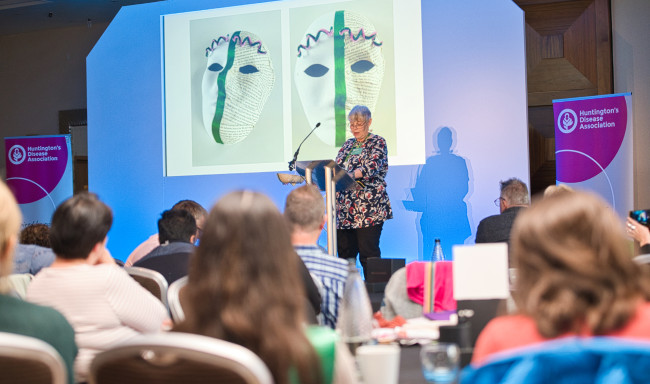Getting involved with current research studies is a great way to help professionals in projects that will inevitably help the Huntington's community present and future.
The psychological experiences of using Pre-implantation Genetic Testing (PGT) in the context of Huntington’s disease.
Lancaster University
About the study:
The purpose of this study is to understand the experiences of those who have personally undergone Pre-implantation Genetic Testing (PGT-M) in the process of starting a family.
This is so that researchers can:
- Understand the experiences of a person who, at the time of using Pre-implantation Genetic Testing (PGT-M), was either gene-positive or at risk of Huntington’s disease
- Understand the experiences of a person whose partner was gene-positive or at risk of Huntington’s disease at the time of using Pre-implantation Genetic Testing (PGT-M)
- Understand the demands of using this option and how these may evolve
- Identify key themes across participants and share findings about using this reproductive option
Who can take part:
- Adults aged 18 and over
- Individuals who have personally undergone Pre-implantation Genetic Testing (PGT-M), regardless of whether this resulted in the birth of a child or not
- Individuals who were at-risk of Huntington’s disease, or gene positive, at the time of using Pre-implantation Genetic Testing (PGT-M)
- Individuals who were the partner of the person who was at risk or gene positive at the time of using Pre-implantation Genetic Testing (PGT-M)
Exclusion criteria:
Unfortunately, the current study cannot investigate those actively going through Pre-implantation Genetic Testing (PGT-M).
How to get involved:
Please contact the researcher, Kevin Power, at k.power2@lancaster.ac.uk if you would like to get involved.
Participants will be asked to complete a 60–90-minute online interview via Microsoft Teams.
When the interview has been completed, participants will receive a £20 voucher as a thank you.
Study opens on 13 February 2026 and closes on 31 December 2026
Development and validation of Huntington's disease-specific quality of life tools
Galen Research Limited
About the study:
Galen Research Limited would like to get the views of people whose partner lives with Huntington’s disease on a Quality of Life questionnaire they are developing.
Who can take part:
Researchers would like to hear from partners of someone who has had a predictive test for Huntington's disease, tested positive, and is currently well.
How to get involved:
For more information or to sign up please call 0161 7019136 or email genetics.research@mft.nhs.uk
This study closes in September 2026.
Vignettes for Change: Co-designing real-life scenarios to improve Huntington's disease care worldwide
Edith Cowan University
About the study:
This international study involves developing short real-life stories (vignettes) based on the experiences of people living with Huntington’s disease and their primary caregivers.
These stories will help to improve care and raise awareness of the challenges faced by the Huntington’s community, and help healthcare professionals and decision-makers improve care practices around the world.
Who can take part:
- Adults aged 18 and over
How to get involved:
Please contact the researchers, Dr Travis Cruickshank at t.cruickshank@ecu.edu.au and Alex Fisher at Alexandra.fisher@nhs.net if you would like to get involved.
Participants will be asked to complete a 60-minute interview (with breaks if needed) either online or via the telephone. With your permission, this will be recorded.
The interviewers would like to discuss:
- Changes you have noticed
- Your day-to-day activities
- Where and with whom you live
- Basics like water, electricity, and food
- Money and transport
- Who helps you
- Your contact with health or social services
Participants will be able to pause, skip questions, or stop the interview at any time, and a family member or friend can join if you would like.
Participants will also be invited to a short 20-30 minute follow-up to check that the story given is accurate.
Study is open until 01 June 2026
Exploring the experiences of people with a family history of genetic conditions in obtaining insurance
University Hospitals Southampton NHS Foundation Trust
About the study:
Despite the 'Code on Genetic Testing and Insurance' and the moratorium, some individuals struggle to obtain insurance when there is a genetic condition in their family. There is a lack of published research in this cohort of individuals. The last published research in the UK was in 1998, nearly 30 years ago, when the landscape of clinical genetics was very different, with limited genetic testing available.
This study hopes to gather information about people's experiences regarding obtaining insurance, so that researchers can better understand whether having a genetic condition in the family affects individuals when they try to obtain insurance.
Who can take part:
- Adults aged 18 and over
- Adults who have a genetic condition or genetic change in their family
- Adults who have life insurance, or have tried to obtain life insurance
How to get involved:
Please contact the researcher, Luc Van Rensburg, at Luc.VanRensburg@uhs.nhs.uk if you would like to get involved.
Participants will be asked to fill out an online survey which will ask questions about the genetic condition in your family, your health, and your experiences in obtaining insurance.
Study is open until 28 February 2026
Attitudes towards Huntington’s disease genetic testing
Deciding whether or not to go through genetic testing for Huntington's disease is a difficult decision. That’s why a team of researchers (Professor Simona Botti at the London Business School, Dr. Selin Goksel at Vrije Universiteit Amsterdam, and Dr. Nazli Gurdamar-Okutur at Koc University) has created a research study which aims to understand the psychological consequences of testing for Huntington’s disease.
What does it involve?
The study consists of filling in a short online survey that takes approximately five minutes.
Who can take part
The researchers are looking for individuals who have already started developing symptoms of the Huntington’s disease. The survey includes several questions assessing participants’ current psychological wellbeing. The researchers will donate £2 for each participant who fills out the survey completely to the Huntington’s Disease Association.
How to get involved
Research news highlights
uniQure
uniQure's gene therapy, AMT-130 appears to slow down signs of Huntington’s disease in Phase I/II clinical trial
Skyhawk Therapeutics
Positive news from Skyhawk Therapeutics' Phase 1 trial for SKY-0515
Read the article
Keep up to date with studies and research news




